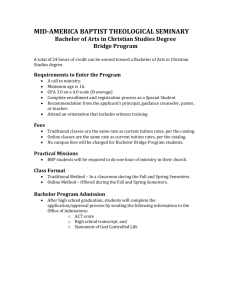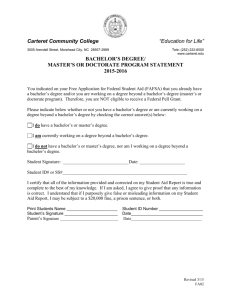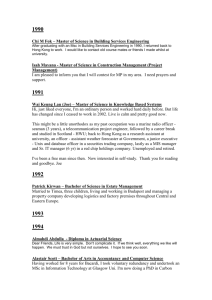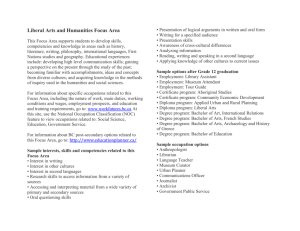University of Canberra
advertisement
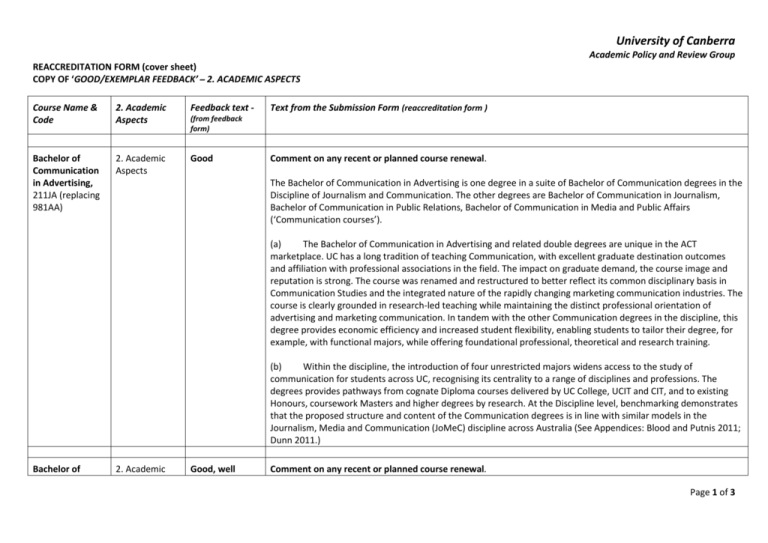
University of Canberra Academic Policy and Review Group REACCREDITATION FORM (cover sheet) COPY OF ‘GOOD/EXEMPLAR FEEDBACK’ ̶ 2. ACADEMIC ASPECTS Course Name & Code 2. Academic Aspects Feedback text - Bachelor of Communication in Advertising, 211JA (replacing 981AA) 2. Academic Aspects Good Text from the Submission Form (reaccreditation form ) (from feedback form) Comment on any recent or planned course renewal. The Bachelor of Communication in Advertising is one degree in a suite of Bachelor of Communication degrees in the Discipline of Journalism and Communication. The other degrees are Bachelor of Communication in Journalism, Bachelor of Communication in Public Relations, Bachelor of Communication in Media and Public Affairs (‘Communication courses’). (a) The Bachelor of Communication in Advertising and related double degrees are unique in the ACT marketplace. UC has a long tradition of teaching Communication, with excellent graduate destination outcomes and affiliation with professional associations in the field. The impact on graduate demand, the course image and reputation is strong. The course was renamed and restructured to better reflect its common disciplinary basis in Communication Studies and the integrated nature of the rapidly changing marketing communication industries. The course is clearly grounded in research-led teaching while maintaining the distinct professional orientation of advertising and marketing communication. In tandem with the other Communication degrees in the discipline, this degree provides economic efficiency and increased student flexibility, enabling students to tailor their degree, for example, with functional majors, while offering foundational professional, theoretical and research training. (b) Within the discipline, the introduction of four unrestricted majors widens access to the study of communication for students across UC, recognising its centrality to a range of disciplines and professions. The degrees provides pathways from cognate Diploma courses delivered by UC College, UCIT and CIT, and to existing Honours, coursework Masters and higher degrees by research. At the Discipline level, benchmarking demonstrates that the proposed structure and content of the Communication degrees is in line with similar models in the Journalism, Media and Communication (JoMeC) discipline across Australia (See Appendices: Blood and Putnis 2011; Dunn 2011.) Bachelor of 2. Academic Good, well Comment on any recent or planned course renewal. Page 1 of 3 Course Name & Code 2. Academic Aspects Feedback text - Human Nutrition, 686AA Aspects answered. Text from the Submission Form (reaccreditation form ) (from feedback form) The BHN underwent a review during the second half of 2012 and approved by Academic Board 12th November 2012. The review was based upon previous performance measures, student comments and staff feedback. As a result of the review, 3 new units have been introduced and the core unit structure changed. The three new units include: two first year units, Introductory Nutrition and Introduction to Food Science; and, a third year unit International Nutrition. The inclusion of these units was to increase the number of nutrition units and the depth of nutrition taught in the course. In addition, the restricted electives have been replaced by open electives. A staged introduction of the BHN changes will be undertaken to take account of the differing cohorts of students currently enrolled in the course. The impact of these changes is unknown as they will not take effect until Semester 1, 2013. We are currently developing a Bachelor of Human Nutrition (Honours) course with a proposed commencement date of July 2013. Students with a high GPA (>6) will be encouraged to enrol in this 4th year option to the BHN. Master of Clinical Psychology, 742AA 2. Academic Aspects 2(b) The Subcommittee was impressed with your retention, progression and student satisfaction rates, as well as your results on the Generic Skills and Good Teaching Scales. 5(e) The Subcommittee wished to Comment on any relevant performance measures (attrition, retention, progression and student satisfaction) identified in the Annual Course Report (ACR) as needing improvement. Generally there is almost no attrition from the MCP, retention is excellent 2012 ACR progression rate 100% and student satisfaction rated at 100%. In the 2013 Course report I recommended continuing to improve our research performance, though this has been strengthened with the appointment of Professor Boer and Dr Magor-Blatch being awarded her PhD. We are stretched to provide the needed clinical supervision as a faculty and the appointment of a clinical facilitator would greatly assist the load on faculty. The 2012 ACR shows the highest ratings of 100% for GSS, GTS and overall satisfaction OSS which are all above faculty average of 84-86%. The qualitative feedback on the 2012 ACR was very good overall. In all these measures we are above Faculty targets. Targeted student support Are any particular forms of support (in addition to standard UC services), offered to students in this course who need extra help, on commencement or later if identified as at risk? How do students know of and access these services? Page 2 of 3 Course Name & Code 2. Academic Aspects Feedback text - Text from the Submission Form (reaccreditation form ) (from feedback form) compliment you on your targeted student support. This is an example of good practice. MCP students have a dedicated MCP room which allows considerable peer support. In the 2012 ACR this was raised as an issue in the qualitative comments and this is a dramatic improvement in facilities. The faculty provide considerable clinical supervision (also research supervision) which means that we know the students well and can usually identify any needs reasonably early. The faculty work very closely with students in the clinic. We sit in with sessions of assessment, work on complex reports and generally supervise work closely in a highly supportive way. Page 3 of 3
